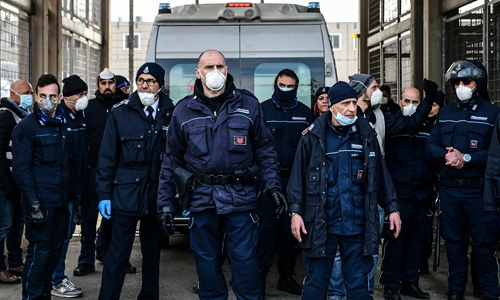National lockdown under test in Italy
Country faces residents’ reluctance to abide, lack of EU help

Prison officers stand guard after an ambulance (rear) entered the Sant'Anna prison during a protest from inmates' relatives in Modena, Emilia-Romagna, in one of Italy's quarantine red zones on Monday. Photo: AFP
While Italy's national lockdown is praised as a sacrifice in its bid to stop the coronavirus spreading, observers wonder whether such a lockdown will be carried out in an orderly fashion, given its residents, under the influence of the country's prevailing individualism, may be reluctant to cooperate, and there is slim chance for the country to get help from other EU members.In a move seen as unprecedented in its modern history, Italian Prime Minister Giuseppe Conte announced on Monday that the lockdown, previously restricted to places in the country's virus-stricken northern region, also known as the "red zone," is now being expanded to the whole country.
"That's right, better to stop the virus immediately in areas where it is still low," Claudio Civetta, an Italian resident in Parma of Northern Italy's Emilia-Romagna, told the Global Times after the nationwide move was announced.
He said that after the lockdown was imposed, he felt control measures in Italy had become tighter. "Finally the police checked the stations, airports and roads between the municipalities. If there are no justified work reasons, people are fined and sent home."
Under the restriction, all public events in Italy will be banned, cinemas, theaters, gyms, discos and pubs closed, and funerals, weddings and sporting events cancelled.
At least 463 people have died of the virus in Italy. The country has 9,172 cases so far, the most of any European country.
Italy's lockdown of the entire country is unparalleled, and will certainly have the effect of slowing the virus' spread, said Wang Peiyu, deputy head of Peking University's school of public health.
For Civetta, the lockdown is a good sign, but it comes too late. "If we had taken alarm signals from China seriously, we would have acted faster."
Many Western media are now using the rhetoric of comparing Italy to China's Wuhan, the first Chinese city to be put under lockdown after the viral outbreak.
Wang said that it is difficult to see how far Italy's lockdown will be enforced, as different countries have different levels of executive power. "If only they can make sure the lockdown is as absolute as China's Wuhan, and deploy strict quarantine measures down to residential communities, it will be helpful in preventing the virus," said Wang.
Under the influence of freedom and individualism, many Europeans staged protests against the government's strict prevention plans, and rejected wearing masks, in what they believe is a sign of defiance of their government.
A Chinese expert told the Global Times that the price Italy pays for such drastic measures is much higher than China, considering its prevailing individualism, and it is considered "politically incorrect" in Western countries, thus, other Western countries are unlikely to follow suit.
Simply ordering a lockdown is not enough, the Italian government should strive to guarantee people's basic lives in the meantime, said Shen Yi, associate professor of international politics at Fudan University in Shanghai.
Several Italians reached by the Global Times said that Italy now faces a severe shortage of protective materials and food, and price gouging of protective products is common. They wondered if the situation will worsen after the lockdown.
Italy's lockdown has affected an estimated 60 million people, a population size akin to China's Hubei Province. When Hubei was under lockdown, 19 other Chinese provinces offered help, such as sending medical resources and staff, along with life necessities.
The EU's coordination ability will also to be tested, and whether it can orchestrate a coordinated response from other European countries to help Italy. If it fails, the integrity of the EU will be under threat, said Ding Chun, director of the Center for European Studies at Fudan University.
Given the current mobilization ability and even infighting among countries in the EU, the possibility of Italy getting help from other EU countries seems slim, said Chinese observers.
EU countries recently refused Italy's plea for face masks through the EU's civil protection mechanism, as other countries worry that they may need to stockpile face masks and other medical gear to help their own citizens, Brussels-based Politico quoted officials and diplomats as saying.


